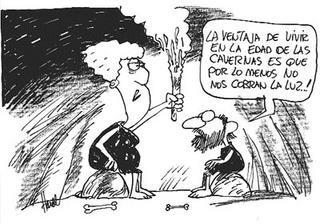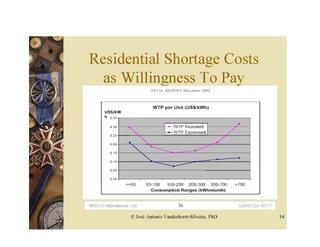José,
En la www y el correo electrónico no existe la anonimidad real!
Saludos cordiales,
José Báez Guerrero
--
Posted by Anonymous to Grupo Millennium Hispaniola at 9/02/2005 02:57:45 PM
viernes, septiembre 02, 2005
Re: Experimento en Apertura: Reglas para Comentarios
The 3rd Patriotic Cry... El 3er Grito Patriótico...
To local and foreign investors:
On April 4th 1999, Listin Diario ran an article on The Patriotic Cry for Electrical Interdependence. On August 30 th, 2005, I made the Second Patriotic Cry for Electrical Interdependence in a presentation to the Santo Domingo Chamber of Commerce and Production. Today, I make my Third Patriotic Cry for Electrical Interdependence.
This Third Cry is based on solid knowledge that the Dominican Republic has one of the greatest opportunities to turnaround its electricity sector towards the end-state of the electricity industry worldwide. To do it, we need to act as an interdependent country which wants to reap the full benefits of the DR_CAFTA. To do it, we need to invite the state of the art forerunners of the electricity industry to place the Dominican Republic into the playground to test the proposed solutions that lead to the end-state.
In that respect, the GMH has reviewed the three options that PJM Interconnection has looked at in the latest post of this edition named "The Reliability Demand Response Model," to complement the strategy earlier proposed to the Dominican Government.
The remaining posts cover interesting issues in Spanish: a casualty of democracy, the high cost of lacking electricity, new management at Edesur, unfulfilled promises to IMF by Edesur, a suggestion to CNE on spending priorities, publication of an article by Milton Morrison, recalling GMH objectives at 5 month of issue, and several posts that show a strong response to the change of GMH comments policy. The remaining notes were mentioned in last edition.
Please find all posts at Grupo Millennium Hispaniola . Recent posts are below the Spanish message.
A los inversionistas locales y extranjeros:
El 4 de abril de 1999, el Listín Diario trajo un artículo con El Grito Patriótico por la Interdependencia Eléctrica. El 30 de agosto, del 2005, hice el Segundo Grito Patriótico por la Interdependencia Eléctrica a la Cámara de Comercio y Producción de Santo Domingo. Hoy hago mi Tercer Grito Patriótico por la Interdependencia Eléctrica.
Este Tercer Grito se basa on conocimiento sólido de que la República Dominicana tiene una de las mayores oportunidades para revertir su sector eléctrico hacia el estado-final de la industria eléctrica mundial. Para hacerlo, necesitamos actuar como un país interdependiente que quiere cosechar los beneficios del DR-CAFTA. Para hacerlo, necesitamos invitar a los delanteros en el estado del arte de la industria eléctrica para colocar a la República Dominicana como el terreno de juego para probar las soluciones propuestas que van hacia el estado final.
A ese respecto, el GMH ha revisado las tres opciones que PJM Interconnections observó en la nota más reciente titulada "The Reliability Demand Response Model," para complementar la estrategia propuesta anteriormente al Gobierno Dominicano.
Las notas restantes cubren asuntos interesantes en Español: una baja a la democracia, el elevado costo de no tener electricidad, nueva administración en Edesur, promesas incumplidas por Edesur, una sugerencia al CNE sobre la prioridad de gastos, publicación de un artículo de Milton Morrison, recordando los objetivos del GMH al 5to mes de su emisión, y varias notas que muestran una respuesta fuerte al cambio de la política de comentarios del GMH. Las notas restantes fueron mencionadas en la pasada edición.
Favor de encontrar todos las notas en Grupo Millennium Hispaniola . Las notas recientes están a continución:
| 9/02/2005 |
| ||
|
| |||
| 9/02/2005 |
| ||
|
| |||
| 9/02/2005 |
| ||
|
| |||
| 9/02/2005 |
| ||
|
| |||
| 9/01/2005 |
| ||
|
| |||
| 9/01/2005 |
| ||
|
| |||
| 9/01/2005 |
| ||
|
| |||
| 9/01/2005 |
| ||
|
| |||
| 9/01/2005 |
| ||
|
| |||
| 9/01/2005 |
| ||
|
| |||
| 9/01/2005 |
| ||
|
| |||
| 9/01/2005 |
| ||
|
| |||
| 8/31/2005 |
| ||
|
| |||
| 8/31/2005 |
| ||
|
| |||
| 8/31/2005 |
| ||
|
| |||
| 8/31/2005 |
| ||
|
| |||
| 8/31/2005 |
| ||
|
| |||
| 8/31/2005 |
| ||
|
| |||
| 8/31/2005 |
| ||
The Reliability Demand Response Model
The options they had were:
1. Eliminate the resource adequacy construct entirely
The need for a guarantee of reliable supply and the current lack of demand-side response makes this solution infeasible at this time. This may be a good end-state solution that will develop over time as the market continues to mature and significant demand response develops. Therefore, this solution will need to be coupled with an interim solution, and it will receive consideration at a future date.
2. Administrative solution
Under this solution, an administrative fee would be set, which would be called a surcharge for reliability. This fee, which is similar to a capacity deficiency rate, would be paid by all load which had not self-supplied or bilaterally contracted with generation by a certain forward date. The administrative fee would be set periodically based on analytical analysis that includes locational components. When setting the surcharge, the setting entity would consider the need to incent demand response, certain generation types and certain generation fuel sources to maintain acceptable generation reliability standards. The advantage of this solution would be that it could be constructed to deal with the issues that were highlighted above. The disadvantage of this solution is that it requires an entity to set the rates. This solution suggests a return to a regulated regime and would deprive consumers of the advantages of market-based competition .
3. Reliability Pricing solution
This solution is based on developing an algorithm that determines a reliability-based price. The key advantage of using an algorithmic based approach is that it sets prices based on key reliability-based metrics that are developed based on technical analysis. These metrics drive the calculation of a Reliability Pricing result through an optimization algorithm. Another advantage of this approach is that it provides a mechanism under which the pricing incentives will drive conformance with reliability requirements on system-wide and locational basis. This approach is best described as an optimization-based market clearing algorithm which minimizes the costs to meet capacity requirements as constrained by the reliability-based metrics. This allows the issues identified above to be resolved through an incentive-based approach, and it also provides a mechanism to create viable demand-response alternatives to resolve some issues related to locational constraints.
1. The need for a guarantee of reliable supply and the current lack of demand-side response makes this solution infeasible at this time.
Muy Mala Señal: Renuncia Gustavo Montalvo
En la carta de renuncia de Gustavo Montalvo percibimos un mal presagio para el futuro del país. Su deseo "Les deseo seguir luchando por un mejor país donde imperen la institucionalidad, los principios y los valores democráticos," parece reflejar todo lo contrario - este no es a su modo de ver un lugar donde en estos momentos se está luchando por un país mejor, ni parece ser uno en vía de imperar la institucionalidad, ni los principios y valores democráticos. De lo contrario, su renuncia sería altamente contradictoria.
Percibimos también que está desarrollándose un flaco servicio y un deterioro en la profesionalidad. Si eso fue lo que Montalbo dejó entrever en su renuncia, entonces nuestro liderazgo va en gran picada. Esperamos estar equivocados en nuestras simples percepciones, pero en el GMH al igual esperamos que sus lectoras y lectores estén alertas para que no digan más tarde "I didn't know," como decían los alemanes al final de la guerra. No esperemos a que la tercera es la vencida, porque entonces lo más seguro es que será muy tarde.
Esta es la carta de Gustavo Montalvo:
Estimados:
Por este medio informo de mi renuncia a mi condición de Director Ejecutivo de Pro-reforma, Coordinación nacional del proyecto de Modernización y Reforma de la Presidencia de la Republica, de Coordinador Técnico de la Comisión Nacional de Ética y Combate a la Corrupción y enlace del Secretariado Técnico con el Consejo Nacional de Competitividad.
Mi renuncia está fundamentada por desacuerdo con decisiones presidenciales que, a mi juicio, vulneran la institucionalidad y principios innegociables.
Para mi ha sido una gran satisfacción laborar junto a ustedes por su alto espíritu de servicio y profesionalidad.
Les deseo seguir luchando por un mejor país donde imperen la institucionalidad, los principios y los valores democráticos.
Saludos Cordiales,
Gustavo Montalvo
El Costo de Vivir Hoy en la Edad de las Cavernas

Muchos están viviendo en la Edad de las Cavernas, porque prácticamente no reciben luz. En muchos casos ni le cobran la luz. Queda entonces una pregunta ¿cuánto le cuesta la luz? Si la respuesta es nada están completamente equivocados. Aunque no tengan costo de abastecimiento - facturas - todavía tienen un costo de desabastecimiento - el costo que inducen los apagones a los que en el Siglo XXI están condenados a vivir en la Edad de las Cavernas.

Como se puede inferir de la gráfica, en la medida en que los kilovatios recibidos se reducen (el costo de vivir hoy en la Edad de las Cavernas) es muy superior al costo de los que viven en los sectores que prácticamente no tienen apagones. No obstante, esos clientes-consumidores está dispuestos a pagar, porque de hecho gastan en velas, en malos ratos, en oportunidades perdidas, como no poder enviar a sus hijos a la escuela, en el riesgo de perder las pocas cosas que tienen por fuegos, etc., etc.
Re: Grupo Millennium Hispaniola: Fernández Aplicará Plan de Ahorro Energía por Decreto
On 9/1/05, J.Abbott van der Horst <jav@javig.com> wrote:
J.Abbott van der Horst has sent you a link to a weblog:
no dejes caer este podium o tribuna de expresion sean mas insistentes en soluciones alternas a lo tradicional, ver producto distribuido por javig.com en RD como alternativa al decreto de Fernandez.
Blog: Grupo Millennium Hispaniola
Post: Fernández Aplicará Plan de Ahorro Energía por Decreto ver Link
--
Powered by Blogger
